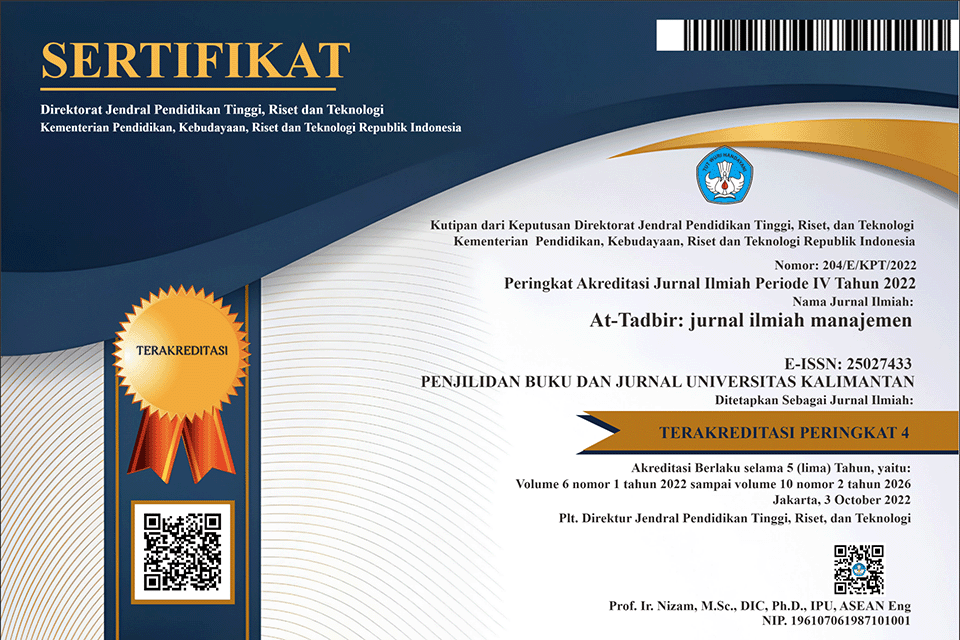Implikasi Budaya Organisasi Dan Kepemimpinan Terhadap Kinerja Karyawan Pada Bank Bri Karawang
(1) Universitas Singaperbangsa Karawang
(2) Universitas Singaperbangsa Karawang
(*) Corresponding Author
Abstract
Employee performance is very important in an organization, because the success of an organization is very dependent on the quality and performance of human resources in the organization. Several aspects of employee performance levels are needed and can be determined at the same time, including organizational culture and leadership capabilities. Several previous studies have shown that the role of organizational culture is very important, and it is very likely that it is motivated by leaders in the organization. Banking is one of the industries with a fairly high employee turnover rate. Therefore, this research was conducted in one of the branches of BRI Bank Karawang branch. The purpose of this study was to examine its effect on employee performance, organizational culture and leadership. The research was conducted at Bank BRI Karawang, with a sample of 70 employees. Data was collected using a questionnaire as a research tool. The analysis technique used is multiple linear regression analysis. The results of the analysis show that organizational culture has a positive effect on employee performance, while leadership has an effect on employee performance. However, the results of the influence of leadership show better results than organizational culture.
Keywords
Full Text:
PDFReferences
Arep, Ishak dan Hendri Tanjung. 2003. Manajemen Sumber Daya Manusia. Universitas Trisakti: Jakarta.
Awadh, A. M., & Alyahya, M. S. (2013). Impact of organizational culture on employee performance. International review of management and business research, 2(1), 168.
Chiniara, M., & Bentein, K. (2016). Linking servant leadership to individual performance: Differentiating the mediating role of autonomy, competence and relatedness need satisfaction. Leadership Quarterly, 27(1), 124-141. https://doi.org/10.1016/j.leaqua.2015.08.004
Eliyana, A., Ma'arif, S., & Muzakki. (2019). Job satisfaction and organizational commitment effect in the transformational leadership towards employee performance. European Research on Management and Business Economics, 25(3), 144-150. https://doi.org/10.1016/j.iedeen.2019.05.001
Free Press. Bernardin, H. John, dan Joyce E.A Russel. 2003. Human resource management (An Experimental Approach International Edition). Mc. Graw-Hill Inc. Singapore.
Ghozali, Imam. 2006. Aplikasi Analisis Multivariate dengan Program SPSS (Edisi Ke 4). Semarang: Badan Penerbit Universitas Diponegoro.
Gibson, J L., Ivanicevic J. M., Donelly, J. H., & Konopaske, Robert. (2009). Organizations Behevior, Structure, Processes (13th ed). New York: McGraw-Hill.
Handoko, T. Hani. 2000. Manajemen Personalia dan Manajemen Sumber Daya Manusia. BPFE. Yogyakarta.
Ilham, R. (2018). The impact of organizational culture and leadership style on job satisfaction and employee performance. Journal of Advanced Management Science, 6(1), 50-53.
Kammerhoff, J., Lauenstein, O., & Schutz, A. (2019). Leading toward harmony - Different types of conflict mediate how followers' perceptions of transformational leadership are related to job satisfaction and performance. European Management Journal, 37(2), 210-221. https://doi.org/10.1016/j.emj.2018.06.003
Kartono, Kartini. 2008. Pemimpin dan Kepemimpinan, Jakarta: CV. Rajawali Kencana.
Kreitner, Robert & Kinicki, Angelo, 2005, Organizational Behavior, Mc Graw Hill Companies, Inc. New York 98
Kreitner. Robert, & Kinicki. Angelo. (2007). Organizational Behavior. 7th ed. McGrawHill Inc. New York.
Lolowang, N. L., Troena, E. A., Djazuli, A., & Aisjah, S. (2019). The effect of leadership and organizational culture on employee performance that is educated by motivation (study on the implementation empowerment programs in Jayapura city). Problems and perspectives in management, (17, Iss. 1), 268-277.
Mahsun, Mohamad. 2006. Pengukuran Kinerja Sektor Publik: Cetakan Pertama Yogyakarta: Penerbit BPFE-Yogyakarta.
Manggis, I. W., Yuesti, A., & Sapta, I. K. S. (2018). The Effect of Career Development and Organizational Culture to Employee Performance with Motivation of Work as Intervening Variable in Cooperation in Denpasar Village. International Journal of Contemporary Research and Review, 9(07), 20901-20916.
Martoyo, Susilo. 2000. Manajemen Sumber Daya Manusia. Jogjakarta: PT BPFE.
Miftah, Thoha. (2013). Perilaku Organisasi Konsep Dasar Dan Implikasinya. Jakarta: PT. Raja Grafindo Persada.
Mitchell, T. R., & Scott, W. G. (1987). Leadership failures, the distrusting public, and prospects of the administrative state. Public Administration Review, 47(6), 445-452. https://doi.org/10.2307/975885
Na-Nan, K., Chaiprasit, K., & Pukkeeree, P. (2018). Factor analysis-validated comprehensive employee job performance scale. International Journal of Quality & Reliability Management.
Nazir, Moh. 2009. Metode Penelitian. Jakarta: Ghalia Indonesia.
Nitisemito, Alex.S, 2006, Manajemen Personalia: Manajemen sumber Daya Manusia, Edisi Keempat, Ghalia Indonesia, Jakarta.
Pabundu, Tika, 2006, Budaya Organisasi dan Peningkatan Kinerja Perusahaan, Jakarta: Cetakan Pertama, PT Bumi Aksara.
Piantara, S., Hersona, S., Martini, N., & Suyaman, D. J. (2021). Pengaruh Budaya Organisasi, Motivasi Dan Lingkungan Kerja Terhadap Kinerja Mitra Dinas Koperasi Dan UKM. At-Tadbir: jurnal ilmiah manajemen, 5(2), 106-119.
Pigors, P. (1933). Leadership and domination among children, 140-157. Houghton Mifflin Company
Rivai, Veithzal dan Ahmad Fawzi. 2005. Performance Appraisal, Sistem yang Tepat untuk Menilai Kinerja Karyawan. Jakarta : RajaGrafindo Persada.
Rivai, Veithzhal, 2005, Manajemen Sumber Daya Manusia untuk Perusahaan: dari Teori Ke Praktek, Penerbit PT. Raja Grafindo Persada, Jakarta.
Robbins, Stephen P, 2003, Perilaku Organisasi, Edisi 9 Jilid 1, Indeks Kelompok Gramedia, Jakarta.
Robbins, Stephen P. dan Timothy A. Judge, 2008, Perilaku Organisasi, Edisi 12 Jilid 1 dan 2, Jakarta: Salemba Empat.
Rozanna, N., Adam, M., & Majid, M. S. A. (2019). Does job satisfaction mediate the effect of organizational change and organizational culture on employee performance of the Public Works and Spatial Planning Agency. IOSR Journal of Business and Management, 21(1), 45-51.
Santoso, Singgih. 2010. Mengolah Data Statistik Secara Profesional. PT. Alex Media Komputindo. Jakarta.
Schein, Edgar, 2005, Organization Culture and Leadership, Jossey Bass, San Fransisco, USA.
Simamora, Henry. 2004. Manajemen Sumber Daya Manusia. Edisi III. STIE YKPN. Yogyakarta.
Singarimbun, Masri dan Sofian Effendi. 2008. Metode Penelitian Survei, Jakarta: LP3ES.
Sondang P. Siagian, 2003. Teori dan Praktek Kepemimpinan, PT. Rineka Cipta Jakarta.
Stogdill, R. M. (1974). Handbook of leadership: A survey of theory and research. New York, NY: Free Press.
Sugiyono, Dr. 2010. Metode penelitian Kuantitatif Kualitatif dan R&D, Penerbit Alfabeta
Wirawan. 2007. Budaya dan iklim organisasi: teori aplikasi dan penelitian, Jakarta: Salemba Empat.
DOI: http://dx.doi.org/10.31602/atd.v6i1.4492
Refbacks
- There are currently no refbacks.
Copyright (c) 2022 Gian Dirgantara, Sonny Hersona GW
---------------------------------------------------------------------------------------------------------------------
At-Tadbir: Jurnal Ilmiah Manajemen is licensed under Creative Commons Attribution-Share A like 4.0 International License




